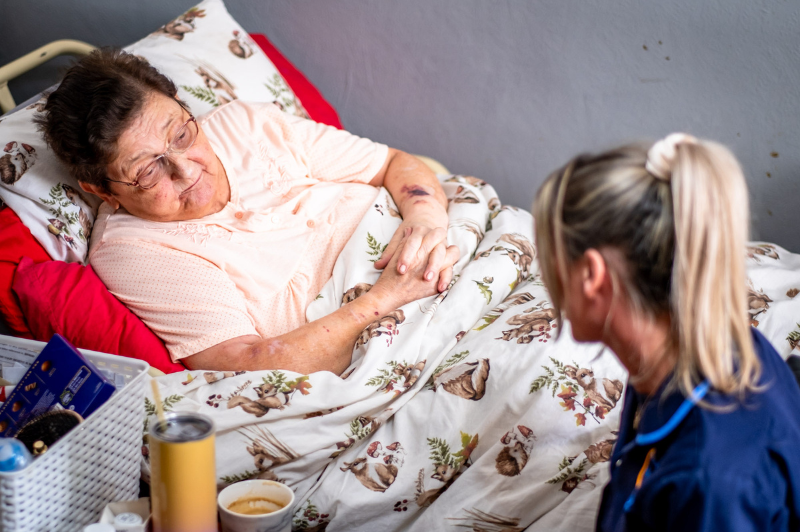Taking care of our health as we grow older is crucial. One of the most important things we should pay attention to is our blood pressure, which can cause serious health problems if left unchecked.
In this article, we’ll explain what blood pressure is, why it matters, and how small, manageable steps can help you stay healthier for longer.
As your heart beats, it pushes blood through a network of blood vessels, delivering oxygen and nutrients to all body parts, including organs like your heart, brain, and kidneys.
Blood pressure is the force your blood uses to reach your arteries, ensuring adequate blood flow to these vital areas.
High blood pressure – known as hypertension – is a condition where the force of your blood against your artery walls is consistently too high. The condition is common in older adults and is typically symptomless.
That’s why it’s often called the ‘silent killer’.
The good news is that high blood pressure is preventable and treatable. Regularly monitoring your blood pressure is quick, painless, and helps with early diagnosis.
Maintaining a healthy blood pressure through simple lifestyle changes can help prevent serious health issues such as heart attacks, strokes, and kidney disease.
The only way to know your blood pressure is to take a reading. A blood pressure monitor performs a simple test involving an inflated cuff with a pressure gauge around your upper arm.
The gauge measures the pressure in your blood vessels, showing your blood pressure as two numbers. The first number – systolic pressure – records the pressure in your blood vessels as the heart beats. The second number, diastolic pressure, is the pressure as your heart relaxes and fills with blood.
The safest blood pressure is 120/80 or lower, representing a systolic blood pressure of 120 or less and a diastolic blood pressure of 80 or less.
However, as blood pressure is affected by factors including the time of day, exercise, diet, and stress levels, it’s normal for these numbers to fluctuate throughout the day.
Problems only arise when your blood pressure stays too high for too long. An average blood pressure of 140/90 is defined as hypertension.
As blood vessels stiffen with age, it’s common for people over 60 to have an increased risk of high blood pressure.
High blood pressure can damage your organs before you know anything is wrong. Without detection and treatment, high blood pressure can cause:
- Cardiovascular disease.
- Transient ischemic attack (TIA).
- Stroke.
- Heart attack.
- Enlarged heart.
- Heart failure.
- Peripheral artery disease.
- Aneurysms.
- Kidney disease.
- Broken blood vessels in your eyes.
Am I at risk of high blood pressure?
Your risk of high blood pressure is higher if you:
- Have a family history of high blood pressure, cardiovascular disease or diabetes.
- Have a Black African, Black Caribbean or South Asian ethnic background
- Are age 60 or older.
- Have high cholesterol.
- Use oral contraceptives.
- Have obesity.
- Have diabetes.
- Use tobacco products.
- Don’t exercise.
- Eat foods that are high in salt.
Treatments for high blood pressure include making diet and lifestyle changes, including the following:
- Maintain your ideal body weight
- Exercise regularly
- Eat a balanced, diet low in salt, fat and cholesterol, and plenty of fresh fruits and vegetables.
- Limit alcohol to no more than two drinks per day for most men and no more than one drink per day for women and lighter-weight men.
- Manage stress.
- Avoid tobacco and nicotine products.
- Manage lipid levels (LDL, cholesterol, triglycerides) and other health conditions like diabetes.
Always consult your healthcare provider when making changes to your diet and lifestyle.
A GP will typically prescribe blood pressure medicine if:
- your blood pressure is very high
- you’re at higher risk of blood pressure-linked problems, such as a heart attack or stroke
- your blood pressure remains high after making healthy lifestyle changes
There are several medicines for high blood pressure. The medicine your GP recommends depends on things like how high your blood pressure is, your age and your ethnic background.
Most blood pressure medicines are taken as tablets once a day. However, you may need to take more than one medicine to manage your blood pressure.
As part of our commitment to preventative care, Apollo Care Liverpool’s qualified carers can assist with blood pressure checks during visits.
Here’s how to prepare for a blood pressure measurement:
- Wait 30 minutes after smoking, exercising or drinking coffee.
- Go to the bathroom and empty your bladder. Our carers can help with this if you’re unable to do so.
- Roll up your sleeve so the monitor cuff is in complete contact with your skin.
- Try to sit without talking for at least five minutes.
- If possible, sit up straight with your feet flat on the floor.
- Rest your arm on a table in front of you so your arm is at heart level.
Regular blood pressure monitoring is a vital part of staying healthy as you age. Apollo Care Liverpool can help you make small, simple steps that make a big difference to your wellbeing.
If you’d like to hear how we can help you or a loved one live a healthier, happier life at home, we’re here to help. Get in touch for a friendly, no-obligation chat.


